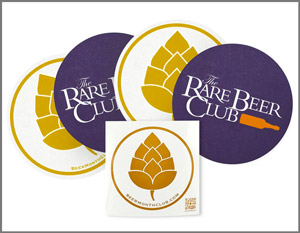A-hem, brew-students, please take your seats. Grab yourself a snifter or similar drinking vessel and pour your 1st featured international beer. Class is now in session. Let's begin with a brief history of the glorious German beers we've sent you this month.
The Northern Bavarian town of Kulmbach is known for a variety of beer styles, but the most notable is the unique beer style indigenous to Kulmbach: "eisbock." This unique style of beer is based on a variant of the traditional "bock bier" initially made famous in the town of Einbeck, Germany, located about 175 miles northwest of Kulmbach. Einbeck's unique beer was not originally known as "bock" beer. Through years of Bavarians requesting "Einbeck Bier" the name was colloquially corrupted to "Ein Bock Bier" (which in German sounds like "one bock beer"), and ultimately just "Bock Bier."
Many years after bocks hit the scene, a variation called "doppelbock," first brewed by monks in Bavaria, rose to popularity after the creation of the original doppelbock, named Salvator (and to this very day you can find Salvator on specialty beer store shelves!) Yet another, "accidental" variation on the theme developed some time later; according to local lore, a wooden barrel of doppelbock bier (in the 6.5-7.5% ABV range) was accidentally abandoned in the yard of a Kulmbach brewery in the dead of winter. Snowfall covered the barrel and it was forgotten until uncovered in the spring thaw. When it was discovered, the contents were partially frozen, and the barrel had split open enough to expel some of the original contents, though a fair amount of the original brew remained in the barrel. The encasing ice was chipped away, and the residual beer left inside was tasted (crazy brewery staff—they'll drink anything), whereupon it was discovered to be much richer and more concentrated than the original. The reason behind this phenomenal discovery is a matter of simple chemistry; water freezes before alcohol, thus, some of the beer's water content was forced out of the brew and froze, and was then removed as it was chipped away. So basically, the remaining beer underwent a relative increase in the proportion of alcohol to the remaining beer volume. This "technique" was refined, and today gives us one of the beers the region is famous for: Eisbock ("eis" means ice in German.)
The original Bavarian Eisbock, known simply as Kulmbacher Eisbock, is brewed by the Kulmbacher Brauerei. A similar beer is EKU 28, brewed by the Kulmbacher Brewery's long time nemesis, the EKU Brauerei (also located in Kulmbach.) EKU stands for Erste Kulmbacher Union, which translates to "First United Brewery" (read the review of EKU 28 below if you want to know where the "28" comes from.) It was founded in 1872 and for nearly 125 years, the brewery competed fiercely with the Kulmbacher Brauerei, as well as other Kulmbach breweries such as Reichelbrau, Sandlerbrau and Monchshof.
Remarkably, the 'miracle' of corporate ownership has helped these breweries reconcile their differences—in 1996, these independent breweries became part of the same company, adopting the title of the simplest among them, the Kulmbacher Brauerei AG (or Kulmbacher Brewery Ltd.) While today united under the same name, each brewery continues to operate independently. That is, the original Kulmbacher Brauerei still makes the beers they built their reputation on, and the EKU Brauerei still makes the EKU 28 and EKU Pils that they've been brewing for a combined 170 years! This month, we've lined up both of these historic EKU brews for you to enjoy. Prost!
For more (German) information about EKU and Kulmbacher, check out their web site at http://www.kulmbacher.de.



